|
|
|
Sort Order |
|
|
|
Items / Page
|
|
|
|
|
|
|
| Srl | Item |
| 1 |
ID:
101971
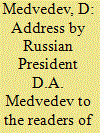

|
|
|
|
|
| Publication |
2010.
|
| Summary/Abstract |
The present issue of the journal is devoted to Russia's cooperation with the Association of Southeast Asian Nations (ASEAN).
Established in 1967, ASEAN has become one of the most authoritative and influential regional organizations. The experience of its development has confirmed that countries with different levels of socio-economic development, different political systems and histories can constructively interact, realizing the "unity in diversity" concept in practice. ASEAN's effective dialogue partnership with individual states and international structures helps expand cooperation and ensure security in the Asia Pacific region on the practical level.
|
|
|
|
|
|
|
|
|
|
|
|
|
|
|
|
| 2 |
ID:
100322
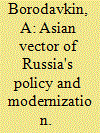

|
|
|
|
|
| Publication |
2010.
|
| Summary/Abstract |
International Affairs": We all know that the APR is developing into another power center as a hub of global economic development with a much greater impact on global politics. What are the main factors behinds its balanced development and what is Russia's role in these processes?
Aleksey Borodavkin, Deputy Foreign Minister of Russia: In recent years, the center of global economic development and political interaction has shifted to the APR where the East Asian export-oriented economies, though hit, together with the rest of the world, by adverse conjuncture, suffered much less of the global financial and economic crisis than Europe and America. The region has retained its role of a driving force of world economy; the national economies are much closer intertwined than before which adds vigor to regional economic integration and stirs up centripetal trends behind the polycentric regional order which is taking shape before our eyes.
Russia, Siberia and the Far East in the first place, should capitalize on its geographical proximity to the rapidly rising region to embrace the innovation development patterns and modernize its economy. The meeting chaired by President Medvedev which took place in Khabarovsk on 2 July 2010 arrived precisely at this conclusion.
From the 18th century onwards, Russia realized itself as a great power stretching from the Atlantic to the Pacific and a progressive civi-lizational project. Our past suggests that we should clarify the priorities to be able to join concrete political and economic projects to the advantage of our people.
|
|
|
|
|
|
|
|
|
|
|
|
|
|
|
|
| 3 |
ID:
108217
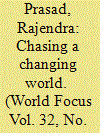

|
|
|
| 4 |
ID:
093746
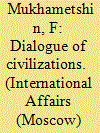

|
|
|
|
|
| Publication |
2009.
|
| Summary/Abstract |
MANY PROMINENT political and academic figures have announced the end of financial globalization as it was before the crisis. The philosophy of globalism itself based on the rapacious use of the planet's resources and complete disregard for the interests and the future of those not included among the "gold billion" has taken a severe blow. The saying goes that nature abhors a vacuum, thus a new paradigm of development of civilization is supposed to come along and replace the failed theory of mono-centric global management of the world.
|
|
|
|
|
|
|
|
|
|
|
|
|
|
|
|
| 5 |
ID:
100695
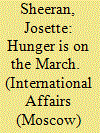

|
|
|
|
|
| Publication |
2010.
|
| Summary/Abstract |
Golden Collection series. The UN World Food Program provides food aid to the world's hungry, thus saving about 100 million people from starvation. Russia contributes to the program by sending the hungry hundreds of tons of grain totaling tens of millions of dollars through the UN World Food Program. Last year Russia chaired the UN WFP Executive Council. Immense efforts have been exerted by the Russian Federation and through our representative to accomplish those tasks that the world community has assigned to the WFP.
|
|
|
|
|
|
|
|
|
|
|
|
|
|
|
|
| 6 |
ID:
104175
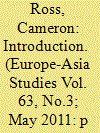

|
|
|
|
|
| Publication |
2011.
|
| Summary/Abstract |
1The Russian Federation currently comprises 83 federal subjects (originally 89). These are divided into six sub-categories, three of which are based on different levels of ethnic autonomy (republics, autonomous okruga and one autonomous oblast') and three purely administrative categories (krai, oblasti and cities of federal importance). In this volume these entities will be referred to collectively as 'regions'.Putin became Russia's prime minister in August 1999, just one week after Chechnya-based militants invaded Dagestan, and his administrative style was cast in the opening months of the ensuing war. Second, shortly after his presidential inauguration in May 2000, Putin announced the reorganisation of the Russian Federation on the model of Russia's seven military districts. Third, on 13 September 2004-barely one week after the Beslan hostage crisis, and in explicit response to 'terrorist' threats-Putin announced the centralised appointment of Russia's regional governors, and an overhaul of the Russian electoral system that promised additional strength for the party of power. Fourth, in January 2010, President Dmitry Medvedev announced the formation of the North Caucasus Federal District with a focus upon the endemic problems of the region.
|
|
|
|
|
|
|
|
|
|
|
|
|
|
|
|
| 7 |
ID:
092191
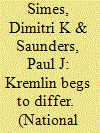

|
|
|
| 8 |
ID:
109731
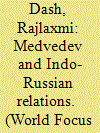

|
|
|
| 9 |
ID:
097957
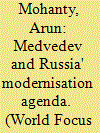

|
|
|
| 10 |
ID:
104181
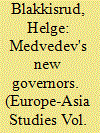

|
|
|
|
|
| Publication |
2011.
|
| Summary/Abstract |
On 7 May 2008, Dmitrii Medvedev was sworn in as the third President of the Russian Federation. Under his two predecessors, the relationship between Moscow and the regions had undergone cataclysmic changes. Boris Yel'tsin's rule had ushered in a period of unprecedented, albeit unsystematic and ad hoc, decentralisation (Teague 199458. Teague, E. 1994. "'Center-Periphery Relations in the Russian Federation'". In (1994) National Identity and Ethnicity in Russia and the New States of Eurasia , Edited by: Sporzluk, R. Armonk, NY: M.E. Sharpe.
|
|
|
|
|
|
|
|
|
|
|
|
|
|
|
|
| 11 |
ID:
082268
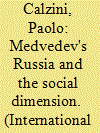

|
|
|
|
|
| Publication |
2008.
|
| Summary/Abstract |
In recent years Russia has, thanks to the action of President Putin, witnessed a significant strengthening politically and economically. After years of crisis, this has finally ensured a condition of stability functional to the compromise that has arisen between the regime and society. The election of a new president, Medvedev, in March 2008, marks the beginning of a development phase that will be no less fraught with unknowns than the previous period and destined to create new challenges for the authorities, especially as concerns the social question, long kept on the margins of official policy. The operational plan for the social dimension envisaging a series of interventions aimed at solving the relative problems represents a commitment that could turn out to be crucial for the country's future.
|
|
|
|
|
|
|
|
|
|
|
|
|
|
|
|
| 12 |
ID:
094372
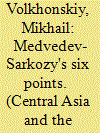

|
|
|
| 13 |
ID:
100343
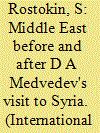

|
|
|
|
|
| Publication |
2010.
|
| Summary/Abstract |
ON MAY 11, 2010, the temperature in Damascus was significantly higher than average. Nevertheless, 37 degrees Celsius did not affect the program of the Russian president's visit. As planned, D.A. Medvedev and Bashar Assad met in the afternoon on the main street of the "old town,'' known two millennia ago as Via Recta.
From the place where the historical street reaches the Eastern Gate (Bab Sharqi), the Russian and Syrian presidents walked to the St. Ananias Chapel. In a narrow side street, packed with antique shops and restaurants, people were coming out from their apartments on upper floors to greet D.A. Medvedev and B. Assad. The atmosphere was extremely relaxed and informal.
It was the first time that the presidents communicated with each other, without a translator, on common topics. B. Assad told his guest about the unique history of old Damascus, the oldest capital in the modern world. The walk probably became the culmination of the visit, emphasizing the remarkable level of personal trust that the two countries' leaders had achieved in their relations.
|
|
|
|
|
|
|
|
|
|
|
|
|
|
|
|
| 14 |
ID:
107228
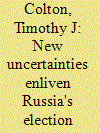

|
|
|
|
|
| Publication |
2011.
|
| Summary/Abstract |
To embrace curbs on his own power, Putin would need to act as much out of character as Medvedev would need to act against instinct in order to confront his benefactor.
|
|
|
|
|
|
|
|
|
|
|
|
|
|
|
|
| 15 |
ID:
104551
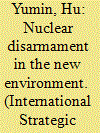

|
|
|
| 16 |
ID:
108194


|
|
|
| 17 |
ID:
101875
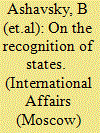

|
|
|
|
|
| Publication |
2010.
|
| Summary/Abstract |
THE ISSUE OF RECOGNITION OF STATES acquired a new relevance and topicality in connection with the declaration of independence by Kosovo, and then by South Ossetia and Abkhazia. Active debates were started concerning the basic criteria for the recognition of states; political and legal aspects of recognition, such as the emergence of a state as a subject of international law; the recognition of a state as a subject of international law only by a part of the international community, and its impact on the status of such a state. They became a subject of a recent roundtable discussion at the Institute for Contemporary International Studies, Diplomatic Academy of the Russian Ministry of Foreign Affairs.
|
|
|
|
|
|
|
|
|
|
|
|
|
|
|
|
| 18 |
ID:
102313
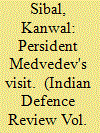

|
|
|
| 19 |
ID:
132944
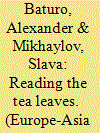

|
|
|
|
|
| Publication |
2014.
|
| Summary/Abstract |
In the absence of public information on the inner workings of the Russian political regime, especially during Medvedev's presidency, outside observers often have to rely on politicians' unguarded comments or subjective analysis. Instead, we turn to quantitative text analysis of political rhetoric. Treating governors as a quasi-expert panel, we argue that policy positions revealed in regional legislative addresses explain how elites perceived the distribution of power between Putin and Medvedev. We find that governors moved from a neutral position in 2009 to a clearly pro-Putin position in 2011, and that policy initiatives advocated by Medvedev all but evaporated from the rhetoric of governors in 2012.
|
|
|
|
|
|
|
|
|
|
|
|
|
|
|
|
| 20 |
ID:
137478
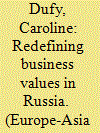

|
|
|
|
|
| Summary/Abstract |
In the aftermath of Russia's accession process to the World Trade Organization in 2011, an extensive public debate emerged on the modernisation of the economy. Enhanced state intervention and authoritarian modernisation were promoted as suitable options for Russia by opponents to neo-liberalism. Medvedev's liberal alternative was promptly discredited in the course of the political competition with Putin. Using ethnographic work, the present essay identifies three models of economic reform and investigates the way they have been considered by professionals in business and trade. The first model, the strategic model, contrary to conventional wisdom, is discussed in the discourse of business actors in terms of economic patriotism, public intervention and state strategic planning; second, the market model is viewed by others as a fully legitimate model; and a third model, the innovation model, combines narratives of efficiency and autonomy, which is attractive but fragile. Beyond their differences, these views have in common a concern to display the relationship of the business sector to the political sphere as a key variable for economic reform.
|
|
|
|
|
|
|
|
|
|
|
|
|
|
|
|
|
|
|
|
|